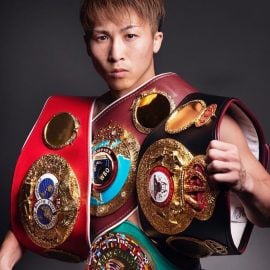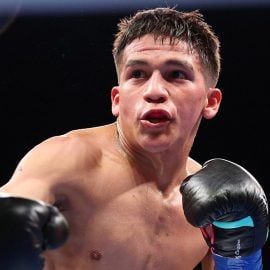Best I Faced – Sharmba Mitchell

Sharmba Mitchell was a talented southpaw who held the WBA junior welterweight title for three-years in the late 1990s-early 2000s.
Mitchell was born in Washington D.C. on August 27, 1970. He was raised in nearby Takoma Park, in a working-class family. His mother worked at the University hospital and father was a postal worker.
“It wasn’t too bad, every place has problems,” Mitchell told The Ring. “You live and you learn on the streets, I learnt a lot from the streets. Street smarts and the wisdom, things to do and not to do and where you want to be and where you don’t want to be. My part of town was OK, it wasn’t the ghetto but it wasn’t Hollywood [laughs.]”
Mitchell’s first love was football and he wasn’t interested in boxing until one day when his father returned home from work and bumped into his friend Adrian Davis, who was a boxing trainer.
“[My dad] asked me to take a ride with him, we went to Adrian Davis gym and looked around,” Mitchell recalled. “My father asked me, ‘How do you like it?’ I said, ‘It’s OK, it’s another sport.’ so he started bringing me to the gym.”
It didn’t take long for Mitchell to excel as an amateur. He claimed gold at the Junior Olympics in 1985. He had to receive special dispensation to fight at the Olympic trails because of his age. He won the Eastern trials but lost to Tony Braxton in the finals. Mitchell stayed amateur, losing to future 130-pound titlist Eddie Hopson in the final at the Golden Gloves in 1988.
Mitchell turned professional, after going 156-7 as an amateur, with a third-round knockout in September 1988.

Floyd Mayweather (right) hits Sharmba Mitchell during their fight on November 19, 2005 in Portland, Oregon. (Photo by Jed Jacobsohn/Getty Images)
Over the course of the nearly six years, he learnt his trade, scoring notable wins over the likes of former world champions Rafael Limon and Rocky Lockridge. Mitchell solidified his status by claiming the NABF title with an eye-opening first round knockout over previously unbeaten Chad Broussard.
However, Mitchell became frustrated at not being able to secure a world title fight and that threatened to derail his promising career. “Little Big Man” lost back-to-back fights against future world champions Leavander Johnson (KO 8) and Steve Johnson (TKO 9).
“I really did it to myself, I wasn’t training and took things for granted,” he admitted. “The first loss to Leavander Johnson, I went in there thinking, ‘He can’t do anything with me whether I’ve trained or not.’ I went in there out-of-shape, unprepared and I still gave him a helluva fight.
“I might have been ahead on the cards [against Johnston]. He hit me with a good punch and I backed up on the ropes and I got stopped for absolutely nothing. I paid the ultimate price.”
After taking stock, he reeled off 11 consecutive victories and finally got his long-awaited title opportunity after convincing his promoter Don King to match him with WBA titlist Khalid Rahilou in Paris, France in October 1998.
“I knew if I didn’t knock him out, I’d have to win decisively, [so] that’s what I did,” said Mitchell, who won a wide 12-round decision. “I knocked him down [four times, twice in the second, once in the third and once in seventh]. I wanted to do a great showing to the world and let everyone know from my home in D.C. that I am the man.
“I was going to make the most of every moment after all the shit I’d been through to get to that point. It came out in that fight. To be able to get back up and achieve something like that is always a great accomplishment.”
The newly minted titlist returned home and made a successful homecoming title defense against Pedro Saiz in February 1999.
“To bring my first title bout and TV back to D.C. that was one of the things I wanted to achieve.” said Mitchell.
Next came a battle for local bragging rights when he met fellow DMV native and sparring partner Reggie Green.
“We come from D.C., it was a D.C thing,” said Mitchell, who edged Green by 12-round majority decision. “That is truly my town, no one is going to beat me in my town. I don’t care if you’re born here too, this is my town. It was a crosstown rivalry.”
Mitchell went west and made two more title defense, on big promotions in Las Vegas while waiting to secure a unification with WBC kingpin Kostya Tszyu. The two were able to broker a deal and met in Sin City in February 2001. While he hoped this would be his crowning moment he was up against matters.
“I was jogging and my leg started to go numb, it was only two or three days before the fight,” he recalled. “I told my trainer and we went to the doctors and he said, ‘You have partial tear. I don’t think you should fight.”
Mitchell went against medical advice and proceeded with the fight.
“I’m beating his ass with a messed-up leg,” he said. “Styles make fights. I wasn’t one to take a lot of punches, I didn’t get hit flush, I don’t really know how hard he hits because he didn’t get the clean hard shots on me. The pain in my knee was so bad, I couldn’t go back out [after Round 7].”
The knee injury kept Mitchell on the sidelines for 13-months. When he returned, he had to climb back up the mountain and in search of a rematch with Tszyu. He scored notable wins over the likes of former titleholder Vince Phillips (MD 12), iron-jawed Ben Tackie (UD 12) and Lovemore Ndou (UD 12).

Sharmba Mitchell and Lovemore N’Dou trade punches during their fight in Atlantic City (Photo by Ed Mulholland/WireImage)
By the time Mitchell met Tszyu again, he left the best of himself in the gym.
“The second fight, I was drained out of my brain,” said Mitchell, who was dropped four-times en route to a third-round stoppage loss. “My fight was making weight, not the fight. I shouldn’t have fought him at that weight. You live and you learn.”
Mitchell decided to carry on with his career, moving up to welterweight. After a win over once-beaten Chris Smith (TD 5), Mitchell had been scheduled to face Zab Judah. However, the New Yorker pulled out and instead he met Floyd Mayweather in November 2005.
“I fought Floyd when I was getting ready to retire, not in my prime,” said Mitchell, who was stopped in six-rounds. “I was that guy who had a great record, a name he could get a win on.”
He bested grizzled Mexican Jose Luis Cruz (UD 10) before losing to Paul Williams (KO 4). Mitchell retired soon after with a record of 57-6 with 30 knockouts.
Mitchell, now 51, is married and has five daughters and one son. He lives in Baltimore and trains a few guys, he’s also personal trainer and does boxing fitness. He is a finance manager at a Chrysler Dodge Jeep Ram car dealership. He owns a bar and lounge called Buckett’s Lounge and a health and wellness smoothie shop called The Purple Flip.
He graciously took time to speak to The Ring about the best he fought in 10 key categories.
BEST JAB
Paul Williams: He used it, a lot of guys don’t use their jab, he actually used his jab. It was always a range finder and he was bigger than me.
BEST DEFENSE
Floyd Mayweather: He always had good defense. I caught him with shots but I couldn’t get him with real good clean shots. A lot of head movement and just his style.
BEST HANDSPEED
Kevin Marston: I’d have to go back to when I first started out. Floyd had handspeed but I fought some bad guys in my weight class. I fought a guy, Kevin Marston, that still today, I think I lost. His handspeed was pretty fast. Floyd had nice hand speed but you’ve got other people who were faster than Floyd but don’t have the skills that Floyd had. [Marston] didn’t have the skills, just the handspeed.
BEST FOOTWORK
Leavander Johnson: He can move around the ring. I had him hurt a couple of times and he could get around and slip around. His footwork was pretty good. He was able to move side-to-side.
SMARTEST
Mayweather: If he couldn’t figure one way, he’ll change up in a minute to figure out another way. He was born to be just what he was, nothing else.
STRONGEST
Reggie Green: He was bigger than me and he could hit. You see what he did with Micky Ward. Paul Williams was tall and lanky, he wasn’t the strongest, he wasn’t going to push me around.
BEST CHIN
Ben Tackie: I was the only one to ever knock him down. I couldn’t believe it. When I knocked him down, he got back up and I was like, ‘He aint hurt, there’s no way he’s hurt.’ [Laughs] His chin was unreal. I just caught him with one he didn’t see.
BEST PUNCHER
Rocky Lockridge: We’re at Meadowlands, I’m on the ropes and boom. The whole room goes black, I sat on the rope for a minute and then I hear the bell go, ‘ding’. I stand there for a minute and walked back to my corner. My corner looked at my eyes and threw some ice on my head. They asked me if I was alright and I said, ‘Where am I?’ He could punch like fuck!
BEST BOXING SKILLS
Mayweather: Floyd’s a counter-puncher. He has great skills; he sets out his game plan to where it has to be. He’s accurate, he doesn’t waste a shot.
BEST OVERALL
Mayweather: There’s nobody in his era like him. He was special. He was one of those people who could switch up in the middle of a fight. He always had great game plans and he executed them. He’s a natural
Questions and/or comments can be sent to Anson at [email protected] and you can follow him on Twitter@AnsonWainwright
















